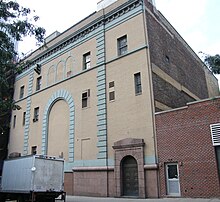
Michael Eugene Archer, better known by his stage name D'Angelo, is an American singer, songwriter, multi-instrumentalist, and record producer. He first garnered attention after co-producing the single "U Will Know" for R&B supergroup Black Men United. His debut studio album, Brown Sugar (1995), was certified platinum by the Recording Industry Association of America (RIAA) and received widespread acclaim from music critics, who have credited the album for ushering in the neo soul movement. Its third single "Lady", reached the top ten on the Billboard Hot 100.

Erica Abi Wright, known professionally as Erykah Badu, is an American singer and songwriter. Influenced by R&B, soul, and hip hop, Badu rose to prominence in the late 1990s when her debut album Baduizm (1997), placed her at the forefront of the neo soul movement, earning her the nickname "Queen of Neo Soul" by music critics.

Voodoo is the second studio album by the American singer, songwriter, and multi-instrumentalist D'Angelo, released on January 25, 2000, through Virgin Records. D'Angelo recorded the album during 1998 and 1999 at Electric Lady Studios in New York City, with an extensive line-up of musicians associated with the Soulquarians musical collective. Produced primarily by the singer, Voodoo features a loose, groove-based funk sound and serves as a departure from the more conventional song structure of his debut album, Brown Sugar (1995). Its lyrics explore themes of spirituality, love, sexuality, maturation, and fatherhood.
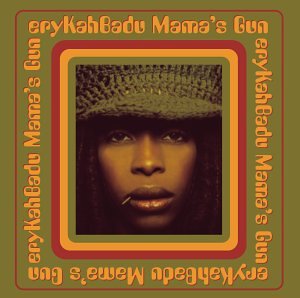
Mama's Gun is the second studio album by American singer Erykah Badu. It was recorded between 1999 and 2000 at Electric Lady Studios in New York and released on November 21, 2000, by Motown Records. A neo soul album, Mama's Gun incorporates elements of funk, soul, and jazz styles. It has confessional lyrics by Badu, which cover themes of insecurity, personal relationships, and social issues. The album has been viewed by critics as a female companion to neo soul artist D'Angelo's second album Voodoo (2000), which features a similar musical style and direction. Critics have also noted that while Badu's first album Baduizm contained its share of cryptic lyricism, Mama's Gun is much more direct in its approach, and places the artist in a subjective position more than its predecessor.

Brown Sugar is the debut studio album by American singer, songwriter, and multi-instrumentalist D'Angelo, released on July 3, 1995, through EMI. The album was recorded during 1994 and 1995 in sessions at Battery Studios and RPM Studios in New York City and at the Pookie Lab in Sacramento. Its production, instrumentation, arrangements, and songwriting were primarily handled by D'Angelo, who employed both vintage recording equipment and modern electronic devices. The songs feature earnest lyrics about love and romance, set against a fusion of contemporary R&B and traditional soul music with elements of funk, quiet storm, and hip hop music.
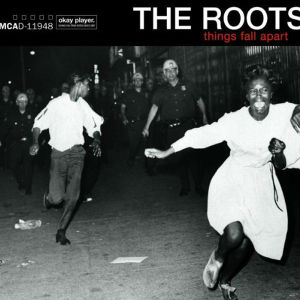
Things Fall Apart is the fourth studio album by American hip hop band the Roots, released on February 23, 1999, by MCA Records. Recording sessions for the album took place at Electric Lady Studios during 1997 to 1998, coinciding with recording for other projects of the Soulquarians collective, including D'Angelo's Voodoo (2000), Erykah Badu's Mama's Gun (2000), and Common's Like Water for Chocolate (2000). According to Spin magazine, the album became a landmark moment for the Roots and the collective, as it "swelled the Roots clique into a movement-style posse".
Russell Elevado is a recording engineer and record producer based in New York City.
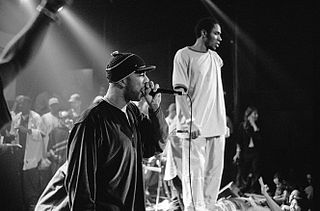
The Soulquarians were a rotating collective of experimental Black music artists active during the late 1990s and early 2000s. Members of the collective included singer and multi-instrumentalist D'Angelo, drummer and producer Ahmir "Questlove" Thompson, producer J Dilla, singer-songwriter Erykah Badu, trumpeter Roy Hargrove, keyboardist James Poyser, singer Bilal, bassist Pino Palladino, rapper-producers Q-Tip and Mos Def, and rappers Talib Kweli and Common. Prior to its formation, Q-Tip, Common, Mos Def, and Talib Kweli were members of the Native Tongues collective, while Q-Tip's original group A Tribe Called Quest served as another inspiration behind the Soulquarians.

American singer Erykah Badu has released five studio albums, one live album, one compilation album, one mixtape, 31 singles, three promotional singles and 20 music videos. Badu's career began after opening a show for D'Angelo in 1994 in her hometown; record label executive Kedar Massenburg was highly impressed with her performance and signed her to Kedar Records. Her debut album, Baduizm, was released on February 11, 1997. It spawned three singles: "On & On", "Next Lifetime", and "Otherside of the Game". The album was certified triple platinum by the Recording Industry Association of America (RIAA). Badu's first live album, Live, was released on November 18, 1997, and was certified double Platinum by the RIAA.

"Feel Like Makin' Love" is a song composed by singer-songwriter and producer Eugene McDaniels, and recorded originally by soul singer-songwriter Roberta Flack. The song has been covered by R&B and jazz artists including Gladys Knight & the Pips, Lou Rawls, Isaac Hays, George Benson, Jeffrey Osborne, Larry Coryell, Johnny Mathis, and Marlena Shaw.

"Untitled (How Does It Feel)" is a song by American singer, songwriter, and multi-instrumentalist D'Angelo. It was released on January 1, 2000, by Virgin Records as a radio single in promotion of his second studio album, Voodoo (2000). Written and produced by D'Angelo and Raphael Saadiq, the song was originally composed as a tribute to musician Prince. "Untitled (How Does It Feel)" contains a vintage style and sound similar to that of Prince's early musical work. The song's lyrics concern a man's plea to his lover for sex.
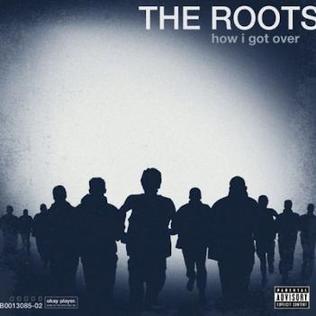
How I Got Over is the ninth studio album by American hip hop band the Roots. It was released on June 22, 2010, by Def Jam Recordings.
The Soultronics was an R&B and neo soul supergroup formed in 2000, which served as the backing band for musician D'Angelo in 2000 during The Voodoo Tour, the supporting tour for his second studio album Voodoo. Several members of the group, including drummer Questlove of hip hop group The Roots, keyboardist James Poyser, trumpeter Roy Hargrove, and Welsh bassist Pino Palladino, had previously contributed to D'Angelo's Voodoo and are also associated with the Soulquarians musical collective. Along with performing during the tour, The Soultronics contributed to Red Hot + Riot: The Music and Spirit of Fela Kuti (2002), a charity release inspired by the music of Afrobeat artist Fela Kuti.

Wake Up! is a collaborative studio album by American R&B recording artist John Legend and hip hop band the Roots, released September 21, 2010, by GOOD Music and Columbia Records. It is Legend's fourth studio album and the Roots' tenth. The album was produced by Legend with band members Ahmir "Questlove" Thompson and James Poyser, and features guest appearances by CL Smooth, Malik Yusef, Common, and Melanie Fiona, among others. Inspired by the 2008 United States presidential election, Legend and the Roots primarily covered 1960s and 1970s soul music songs for the album with social themes of awareness, engagement, and consciousness.

...And Then You Shoot Your Cousin is the fourteenth studio album by American hip hop band the Roots. The album was released on May 19, 2014, by Def Jam Recordings.

Shady XV is a hip hop compilation album performed by various artists of Shady Records. The double disc album was released on November 24, 2014, by Shady Records and Interscope Records. The album was released in honor of the label's 15th anniversary and as its 15th project. The compilation consists of two discs, the first featuring new material from Shady Records artists such as Slaughterhouse, Bad Meets Evil, D12 and Yelawolf, as well as the label's founder Eminem. The second disc includes the label's greatest hits, also featuring former Shady Records members. All previous and current members of the label are represented on the album.
The Second Coming Tour was a concert tour by American R&B/soul singer D'Angelo. The tour was in support of his third studio album, Black Messiah, with performances of new songs and songs from his previous albums.
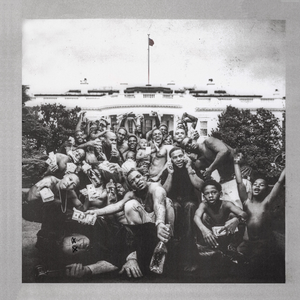
To Pimp a Butterfly is the third studio album by American rapper Kendrick Lamar. It was released on March 15, 2015, by Top Dawg Entertainment, Aftermath Entertainment and Interscope Records. The album was recorded in studios throughout the United States, with production from Sounwave, Terrace Martin, Taz "Tisa" Arnold, Thundercat, Rahki, LoveDragon, Flying Lotus, Pharrell Williams, Boi-1da, Knxwledge, and several other high-profile hip hop producers, as well as executive production from Dr. Dre and Anthony "Top Dawg" Tiffith. Guest appearances include Thundercat, George Clinton, Bilal, Anna Wise, Snoop Dogg, James Fauntleroy, Ronald Isley, and Rapsody.
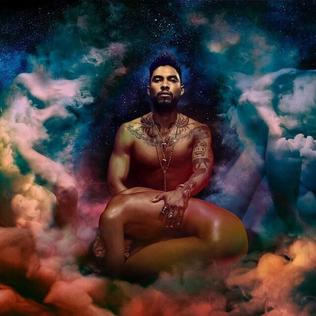
Wildheart is the third studio album by American R&B singer Miguel. It was released on June 29, 2015, by Black Ice Records, ByStorm Entertainment, and RCA Records.

"Really Love" is a song performed by American neo soul singer D'Angelo, issued as the first single from his third studio album Black Messiah. It was his first single since 2008's "I Found My Smile Again". The song was written by D'Angelo along with Vanguard member Kendra Foster; the Spanish spoken-word segment was written and performed by Gina Figueroa. It contains a sample of "We the People Who Are Darker Than Blue" by Curtis Mayfield. The song was produced by D'Angelo. The string section heard during the intro was arranged and conducted by Brent Fischer.

